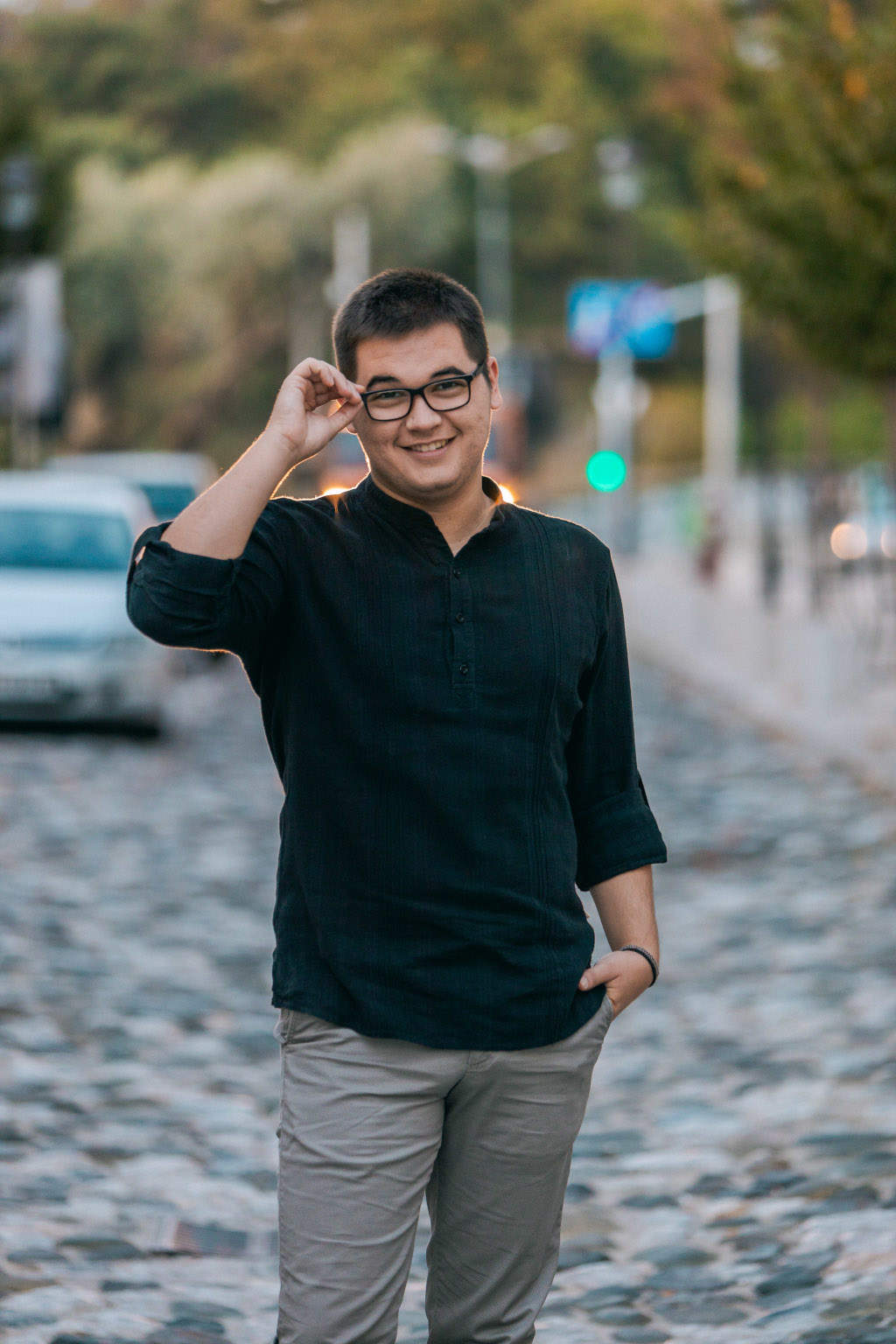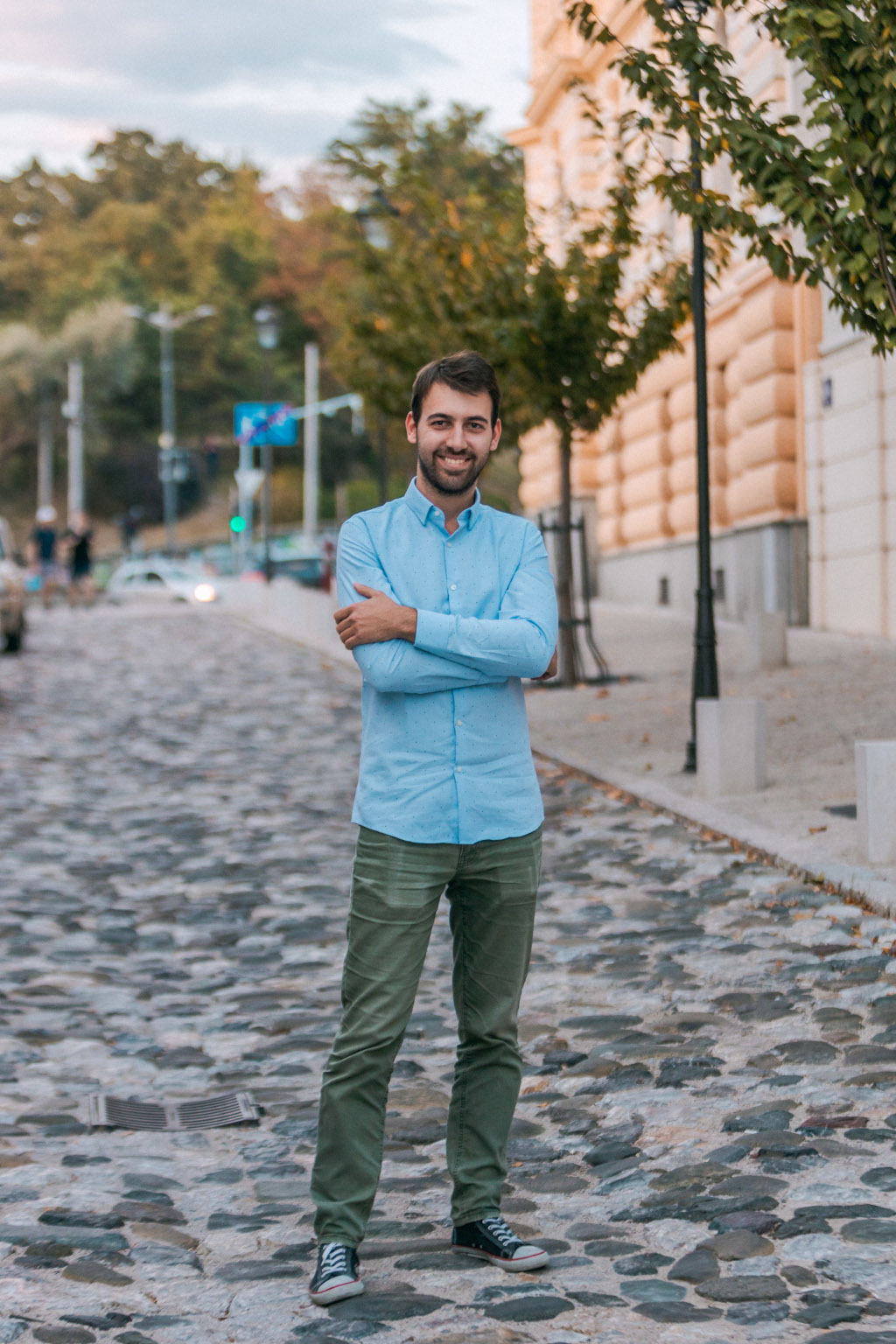MING is a young and promising jazz band colored by bebop sounds, composed of seven friends, including four vocalists Milica Dobrić, Ivana Dimitrijević, Nataša Pejčić and Gorica Šutić, together with pianist, arranger and composer Nevena Pejčić, contrabassist David Gegić and drummer Aleksa Milijanović. By performing original compositions and arrangements of popular jazz standards of the sixties and seventies, MING attracts the attention of numerous audiences of all ages – which they are very proud of.

Studying at the Faculty of Music, at the Department of Jazz and Popular Music, after the first performance at the Belgrade Choir Festival, its members attracted public attention by participating in the competition and festival “Jazz in the Park” in Romania, where they won the third prize. Their uniqueness, originality and special musical expression the audience has applauded at several jazz festivals – Novi Sad, Pančevo, “Metropolis Jazz” in Belgrade, “Jazz and Blues” in Kragujevac, “Northcityfest” in Kosovska Mitrovica. Experiencing jazz as a pure love for music, with the desire to convey that creativity to the listeners, they strive every day for quality and perseverance on the music jazz scene.
THE BEGINNINGS OF THE MING COMPOSITION

Nevena Pejčić: The main culprit for gathering the band was arranging, which we have had as a course in our department for two years – it is called jazz arranging, and as part of that we had the task in the first year to write an arrangement for a smaller band. So I decided to write an arrangement for a female vocal quartet because, we who are in the band are in daily contact already, so I thought why not turn it into some musical vision.
Milica Dobrić: At that time, we were still not an official band, but we performed at the final concert of the jazz department and everyone liked how it sounded. After two months, we received an invitation to perform at the Belgrade Choir Festival, where vocal ensembles, choirs and smaller ensembles participated – quintets, quartets … For that, we had to come up with a name and that’s how we put together our initials: Milica, Ivana, Natasa, Gorica and we got MING, a name that sounded good, and we liked it; it has nothing to do with the Chinese dynasty, yet it is recognizable. David was already playing with us at the first performance, and Aleksa joined us for that concert. We liked the energy we created and decided to stay in that lineup.
Nevena Pejčić: We expanded the repertoire, I continued to write arrangements, after that I started composing and arranging original compositions and everything started in a natural way.
AUDIENCE REACTION
Gorica Šutić: We were encouraged by the reaction of the audience at our performances, which was of different ages, and when we noticed that older people, as well as our peers, react positively, we realized that we have something in the sound that unites all those generations. They often commented on how we remind them of the sound of Predrag Ivanović’s vocal quartet, which is a great honor for us.
Ivana Dimitrijević: We get comments from listeners that it is very unusual to see such young people on stage playing jazz music, very often considered complex and deep … We were surprised by the positive reviews of young people who are also delighted with the way, approach, interpretation and energy we carry on the stage.
David Gegić: As for the reaction of the audience to us, I think that it is very positive and that MING is a great refreshment on the jazz scene in Serbia, especially our female vocals…
Aleksa Milijanović: It is interesting to me that we have both younger and older audiences. I am interested in the older generation from the time of some hits, domestic, I can’t say forgotten songs – long-created songs. They are interested when we present those songs in our arrangement, so they can’t wait for the next concert…
Nevena Pejčić: There were a lot of nice performances, the last one was the Novi Sad Jazz Festival; now maybe a little less than in 2019. This situation is certainly a bit demotivating and somewhat discouraging, but we are trying to put it aside, to move forward and not look back at the current obstacles and slowdowns.
STUDYING AT THE DEPARTMENT OF JAZZ AND POPULAR MUSIC

Gorica Šutić: I must emphasize that a great role in our formation, both as musicians and as people, was played by the jazz department and our professors, who are always there for us and do not have an attitude towards us as if they were our superiors, but always want to give us good advice, to always give us a good opportunity to appear somewhere and to shape our ideas. My other colleagues can say the same, not only from MING but from the entire department, and we are very proud of that fact. I think all that atmosphere that was born between students and professors simply encourages other people to come in and enroll in the jazz department.
Nevena Pejčić: For someone who left home for the first time at the age of 19 in a big unknown city – it was a life challenge, in addition to this professional one. At the beginning, it was difficult in the sense that you are alone now, that everything is up to you. Also, these are all new things, you learn at the faculty, almost everything from the beginning, and from that aspect, great dedication, effort and dedication are needed.
Milica Dobrić: I believe that studying in the jazz department is quite different. The department is called Jazz and Popular Music, and we are also working on original music, which I believe is the ultimate goal for every musician. It was interesting, interactive, we had a lot of subjects, like ensembles or a jazz choir, where we play music in groups, which is a lot of fun.
Nataša Pejčić: The moment of coming to Belgrade was extraordinary for me because I came among the people with whom I completely share interests. In addition to the fact that we are together at the faculty, where we exchange our experiences, we talked at meetings about which musicians we listen to, what we have learned, how to make progress faster…
David Gegić: Professors, courses – it exists at every faculty, but the society and community that we have found – it is something very valuable.
Nataša Pejčić: I think that the opening of the jazz department at the Faculty of Music in Belgrade contributed to the rich scene we have today. I hope that jazz will become as popular in other cities as it has been in Belgrade in recent years.
Aleksa Milijanović: In music high school, I was in contact with a lot of people who were already in college, as well as my friends from the band, so it all turned out nicely when it came to studying. That helped me a lot, and entering MING happened just before my arrival, so I wasn’t in college yet and they invited me to perform with them at the Belgrade Choir Festival.
Milica Dobrić: We all recognized each other by some sensibility and the energy that brought us to the stage simply happened, and I think it will last; I would really like for it to continue and for us to have many other projects to follow.
FROM CLASSICAL MUSIC TO JAZZ
Nevena Pejčić: Classical music is certainly the basis for building the aesthetics of musical taste, and then harmony;in fact, what separates it most from jazz is improvisation, interactive composing in the moment.The whole harmonic language in jazz came, of course, from classical music; jazz only added style and rhythms. And in that sense, those two genres complement each other.
David Gegić: Improvisation is one of the most important things in jazz, and at the same time the difference in relation to classical music and the way of preparation for the performance. In classical music, we have a composition that we rehearse, and when the performance comes, we already know how it should flow from the beginning to the end … from that perspective, I now admire classical musicians very much, maybe more than before. Of course, in jazz, despite the fact that there is a lot of improvisation, we all try and repeat some things in order to find a way to play the best possible, but in principle, something unplanned can always happen.

Aleksa Milijanović: I wouldn’t say for myself that I’m a jazz musician, but that I’m a musician. All that experience I had with classical music some extent – as much as I could have in so many years, helps me to understand music more easily today.
CREATING THE ARRANGEMENT
Gorica Šutić: Our pianist and arranger Nevena Pejčić brings her ideas and arrangements to rehearsals, we start working on it and we all have an equal say and influence on the interpretation through the introduction of our spirit. Nevena Pejčić gives all the ideas, and we all paint and shape them together into the sound of MING.
Ivana Dimitrijević: Thanks to our different characters, the personal identity of each individual stands out and is defined on the stage. Our cooperation and mutual, primarily honest and transparent, relationship is very interesting. Nevena is the driving force or head of the family; she is very flexible when it comes to new ideas and compositions. She is always happy to help if someone has their own composition, to rearrange it so that each of us can make a personal contribution. We succeeded thanks to the arranging and Professor Vladimir Nikolov, who supported us and gave us demanding tasks with the desire to work on our music, arrange, compose and put our ideas on paper.
Nevena Pejčić: I think that when you choose the people you want in your project, they should be those you trust, with whom you are otherwise in contact, with whom you are close and in that way a beautiful story and positive energy can be created… After that comes all that upgrade in the musical sense. The most important thing for me is to have confidence in the people around me. As for the composition, it is somehow common for an instrumental, vocal jazz quartet, ie wind quartet, to be accompanied by a rhythm section. Of course, there are bands without a rhythm section, but since I belong to that rhythm section, we decided on having one, so we invited conrabassist David Gekić and drummer Aleksa Milijanović and they fit in perfectly with the whole story and also along with the female vocalists… It kind of makes a complete picture.
Nataša Pejčić: I would like to put a special emphasis on our rhythm section – Nevena, David and Alex, without whom none of this would really be possible. The vocal composition in this music simply could not have come to the fore if it were not for them, their ideas for arrangements. It is very challenging to be a part of such a band and to sing such complex harmonic structures; we have to pay attention to the color of our voices at all times, but also to the overall sound image that reaches the audience. One should strive for the joint color of the sound to be the winning combination.

David Gegić: The four of them are really the most important in the whole story; if it weren’t for them, that band wouldn’t exist and, of course, Nevena in the role of composer, arranger and someone who leads rehearsals, especially singing. It is still not completely clear to me how it works as a singer, intonation, it is a very difficult and arduous job.
Aleksa Milijanović: Yes, the process of it all is very interesting, starting with the making of the arrangements by Nevena Pejčić. Considering that I am the youngest in the band, this is my first experience of working in a jazz band where notes are brought, so you need to get ready, it was all new to me. I have never done that before – reading notes for the drums, collaborating with other musicians, with guests who performed with us, such as Luka Ignjatović at the Pančevo Jazz Festival. From the beginning until now – it’s a great experience for me.
Ivana Dimitrijević: There is always an original personal stamp of each of us in the band, it’s not just Nevena, vocals, MING as our initials, but literally a part of each of us – Nevena and David, Aleksa, Milica, Gorica, Nataša and me, so our band is bascially an idea combined from all of our ideas and inspirations collectively.
HOW POPULAR JAZZ IS AMONG YOUTH
Gorica Šutić: We all know that jazz music is rarely impresses at first listen. They say that it requires a “trained ear“ and that it is “intelligent“ music. However, I think that jazz is available to everyone, you just need to get used to that music.
Aleksa Milijanović: Honestly, I think that people who don’t just follow jazz are not even aware of how good our jazz scene in Serbia is; it’s not too big, but it’s high quality, and can be compared to Austrian, German, Dutch … Everyone has the freedom to do what they want, and the audience is a clear sign of whether something is successful or not. It takes people to like something in order for it to be expanded. All the shapes that were created molded into something. Just as in classical music we have styles that have been renewed in the way of thinking about music, such as neoclassicism, in jazz there are types of songs whose model is another song, but it becomes completely modern through harmonization and use of instruments.
Gorica Šutić: Unfortunately, I don’t think younger audiences today are much interested in trying to understand something; simply – if something ball is not interesting to you right off the bat and did not attract attention, you immediately switch to something else, such as Instagram and other social media.
Nevena Pejčić: Jazz, in general in the world, does not belong to some popular genres, and therefore it does not in our country either, if I am talking about a wider audience; it is popular among us who engage with it. It is good that there is an environment like the Music School “Stanković“, the Faculty of Music … where we draw inspiration from each other.
David Gegić: As for our generation, I can’t be completely objective because I think that we are in a world of our own, and even for the people I hang out with privately, I wouldn’t say that they belong to the “wider“ population….
Ivana Dimitrijević: Considering that we, as the younger generation, deal with improvised music – jazz, i.e. art, it is interesting to meet a lot of young people without formal education who love and highly respect jazz music and have an inexhaustible source of information. Unfortunately, I have not met many people who are ready to formally approach jazz, that is, to study jazz.
WHAT IS JAZZ MUSIC FOR YOU?
Nevena Pejčić: Jazz music for me is something I love very much, so I would tie it to the word – love, I would tie it to the inspiration I share with the people around me and those who play with me, for the performers and composers I like to listen to and for sharing some beautiful energy and atmosphere.
Aleksa Milijanović: Jazz for me means being a musician for the sake of music – playing what you feel; of course, to play what is written, but you always have that freedom at the moment, when you can do something or take that music somewhere – so it is music in the moment, that’s what I could say.

Milica Dobrić: I believe that jazz is still quite a broad term in comparison to the jazz of the 60’s, when swing, bebop etc were popular…Now it’s more of a term for some freedom in music, in fact it is associated only to some sort of education about the genre. Today, most permeation comes through original music, where each performer brings something of their own, from their own space.
Ivana Dimitrijević: Yes, jazz requires a lot of effort, work, continuity, inspiration and motivation, but I think that this is true for every profession in life. I think that the foundation, that is, the main driver for music and any business is what comes from the heart – love, that’s what really brought us together – the love for music in the first place, and then the love for jazz and the love for what that music actually brings us.
THE MOST MEMORABLE MOMENT
Gorica Šutić: From the day we became a band until today, the moments I remember the most are our first entry into the studio and our last entry into the studio. Thus, the entire period between these two events is included, and so I have an insight into the progress – collective and individual. In that period, we grew together, we changed together both as musicians and as people. We have somehow, let’s say, integrated the whole band and the whole project into our personal identity, so that it is of great importance to me as a member of such a community … to strive for a goal together, to rejoice together, develop and remain faithful to that idea.

Nataša Pejčić: I would like to single out a concert in Romania at the “International Jazz in the Park“ Competition, when we won the third prize completely unexpectedly.
David Gegić: We were outdoors, extremely nicely hosted, the sound system was at a high level, which is very important to us – it is a very special experience, especially since MING won the third prize.
Aleksa Milijanović: Going to Romania is a very nice life experience … to meet some other musicians, to collaborate with sound engineers who are not from Serbia but from some other countries, all this contributes to us in terms of building one person, not as an individual only, but as a singer, drummer, pianist, bassist…
Nevena Pejčić: Then the Pančevo Jazz Festival, the Novi Sad Jazz Festival and the Serbian Jazz Festival, which took place in September last year…
Gorica Šutić: These moments serve as inspiration to continue and as a desire to progress.
Ivana Dimitrijević: In addition to travel, concerts, new acquaintances, each concert is a new lesson because every time something very interesting, new and different happens, because jazz is improvisation, so we have woven it somewhere in our daily lives – that our life is everyday improvisation and socializing. Every time after the concert we like to spend some time together. We are really very close to each other in private and we always like to comment on the good and bad sides, we look at our progress in work and music in general … which helps us to get to know the segments on which we have to work on more or simply keep them as they are.
Nataša Pejčić: I would like to single out the concert in the Banski Dvor in Banja Luka, our first solo concert that we managed to organize with Milan Aćimović.
David Gegić: I think that each of those performances is a memorable moment … the festival in Pančevo is a big festival in Serbia, the one in Novi Sad as well…

Ivana Dimitrijević: Every concert, performance, every one of our tours is actually a lesson for us what needs to be corrected, what needs to be appropriated, what needs to be worked on, etc. But all those collective ups and downs of ours that specifically concern music cooperation only strengthen us even more and contribute to us working even harder on what we started and to perseve in our goal. And our goal is to transfer our love to our instruments, and then we transfer from the instruments to the audience and, well, we just want to spread love, that’s all.
Translation: Jelena Čolović
